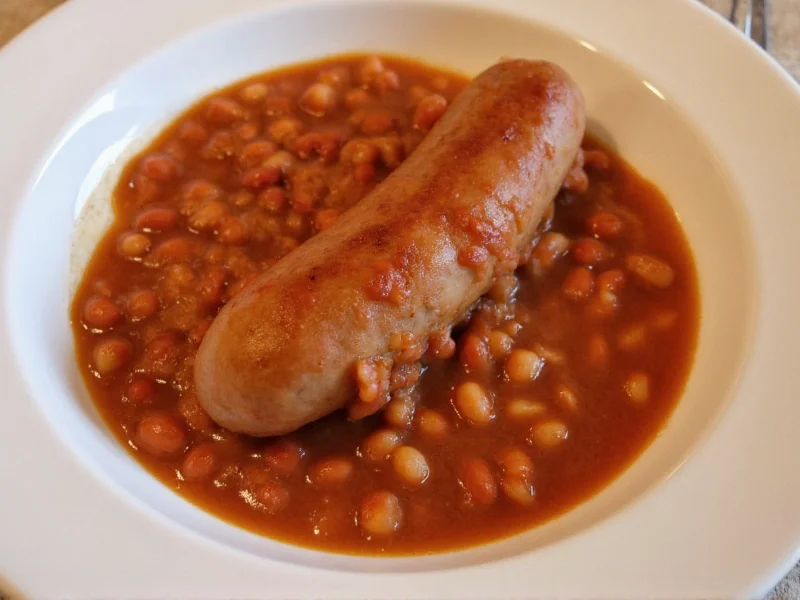Nothing says British comfort food quite like the simple yet satisfying combination of baked beans and sausage. This beloved meal has warmed tables across the UK for generations, offering a perfect balance of savory and sweet flavors with minimal preparation. Whether you're seeking a quick weeknight dinner or authentic taste of British cuisine, understanding the proper preparation methods and ingredient choices makes all the difference.
The Cultural Significance of Baked Beans and Sausage
This humble dish emerged as a staple during World War II rationing when ingredients needed to be economical and shelf-stable. The combination of affordable canned beans and locally produced sausages created a protein-rich meal that sustained families through difficult times. Today, it remains a beloved comfort food across British households, commonly served in pubs as “Bangers and Mash with Beans” – where “bangers” refers to sausages that would “bang” when cooked due to high water content in wartime recipes.
Essential Ingredients for Authentic Flavor
The magic of this traditional British baked beans and sausage recipe lies in selecting the right components:
| Component | Traditional Choice | Modern Alternatives |
|---|---|---|
| Sausages | Pork bangers (coarse-ground) | Lincolnshire, Cumberland, or high-quality chicken sausages |
| Baked Beans | Heinz Original (tomato-based) | Low-sugar varieties or homemade bean sauce |
| Accompaniments | Mashed potatoes, onion gravy | Roasted root vegetables, crusty bread |
Perfect Cooking Techniques for Baked Beans and Sausage
Mastering how to cook perfect sausages with baked beans requires attention to timing and temperature. Start by pan-frying sausages over medium heat for 15-18 minutes, turning regularly until golden brown with an internal temperature of 160°F (71°C). Never pierce sausages while cooking – this releases precious juices that keep them tender.
For the baked beans, pour contents into a small saucepan and heat gently over medium-low heat for 5-7 minutes. Stir occasionally and consider enhancing flavor with a splash of Worcestershire sauce, dash of smoked paprika, or teaspoon of brown sugar. Avoid boiling which can cause beans to break down.
Popular Recipe Variations Across the UK
Regional differences create exciting variations of this classic British comfort food combination. In Northern England, you'll often find the dish served with pickled red cabbage, while Scottish versions sometimes include a whisky-infused gravy. Modern twists on traditional baked beans and sausage recipes include:
- Breakfast bake: Layer beans, sausages, and sliced potatoes in a casserole dish with cheese topping
- Cottage pie fusion: Use the combination as filling beneath mashed potato topping
- Spicy kick: Add chipotle peppers or cayenne to the beans for heat
- Vegan alternative: Substitute plant-based sausages and homemade tomato-baked beans
Nutritional Profile and Balanced Meal Tips
A standard serving of baked beans and sausage provides substantial nutrition when prepared thoughtfully. The protein from quality sausages (18-22g) combines with fiber-rich beans (7-9g) for a satisfying meal. To create a more balanced version of this hearty baked beans and sausage meal:
- Choose reduced-sodium baked beans or rinse canned beans to remove excess sugar
- Select sausages with at least 70% meat content and minimal fillers
- Add steamed greens like kale or broccoli for vitamins and color
- Use sweet potatoes instead of white potatoes for additional nutrients
Common Preparation Mistakes to Avoid
Even experienced cooks make errors when preparing this easy baked beans and sausage dinner. The most frequent issues include:
- Overcooking sausages: Results in dry, tough texture – use a meat thermometer for accuracy
- Boiling baked beans: Causes beans to break apart and sauce to separate
- Mismatched flavors: Avoid overly spicy sausages with sweet bean varieties
- Skipping resting time: Let sausages rest 3-5 minutes after cooking for juicier results
Serving Suggestions for the Perfect Meal
Present your authentic British baked beans recipe with sausages on a warm plate with mashed potatoes as the base, topped with sausages and generously covered with beans. A drizzle of onion gravy completes the traditional presentation. For contemporary styling, serve in a cast-iron skillet or accompany with:
- Fresh parsley or chives for color contrast
- Crispy fried onions for texture
- Side salad with tangy vinaigrette to cut richness
- Cold lager or cider for authentic beverage pairing
Frequently Asked Questions
What's the best type of sausage for baked beans?
Traditional British pork bangers work best with their coarse texture and mild seasoning that complements rather than overwhelms the sweet baked beans. High-quality Lincolnshire or Cumberland sausages provide excellent flavor balance without excessive spices that might clash with the tomato-based beans.
Can I make baked beans and sausage ahead of time?
Yes, you can prepare components separately ahead of time. Cook sausages completely, cool, and refrigerate for up to 2 days. Reheat gently in oven at 325°F (165°C) to maintain texture. Heat beans separately when ready to serve for best results, as prolonged heating causes beans to break down.
How do I prevent sausages from splitting during cooking?
Start sausages in a cold pan with minimal oil, then gradually increase heat. Never pierce the casing, as this releases juices. Cook over medium-low heat for 15-18 minutes, turning regularly. The gradual temperature change prevents casing rupture while ensuring thorough cooking.
What are traditional British baked beans made from?
Traditional British baked beans feature haricot beans in a tomato-based sauce with vinegar, sugar, and spices. The original recipe developed in the US used navy beans slow-cooked with salt pork, but British versions evolved to use haricot beans with a sweeter, thicker tomato sauce that complements sausages perfectly.
How can I enhance store-bought baked beans for this dish?
Elevate canned beans by simmering with one minced garlic clove, teaspoon of Worcestershire sauce, and dash of smoked paprika for 5-7 minutes. A splash of apple cider vinegar brightens flavors, while a teaspoon of brown sugar balances acidity. Never boil vigorously, as this breaks down the beans.











 浙公网安备
33010002000092号
浙公网安备
33010002000092号 浙B2-20120091-4
浙B2-20120091-4